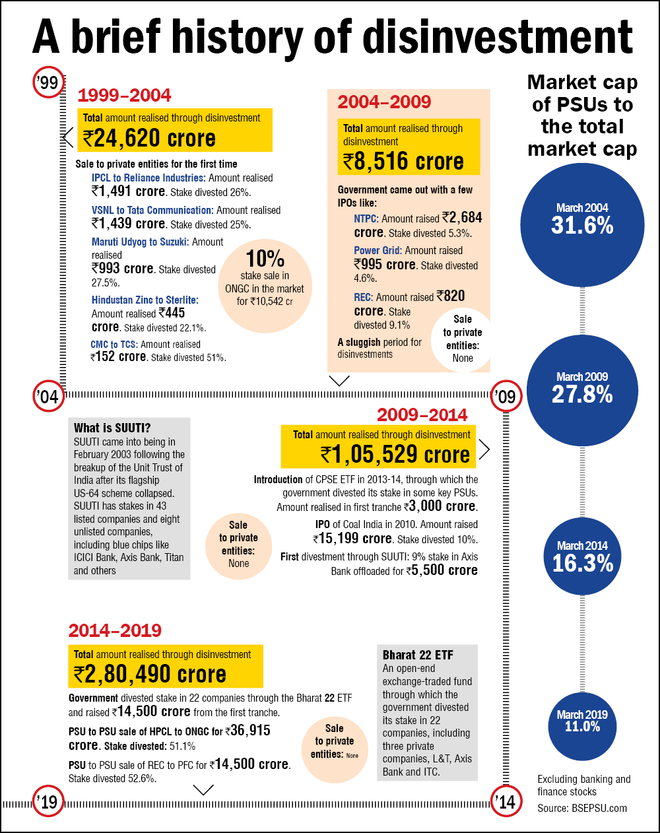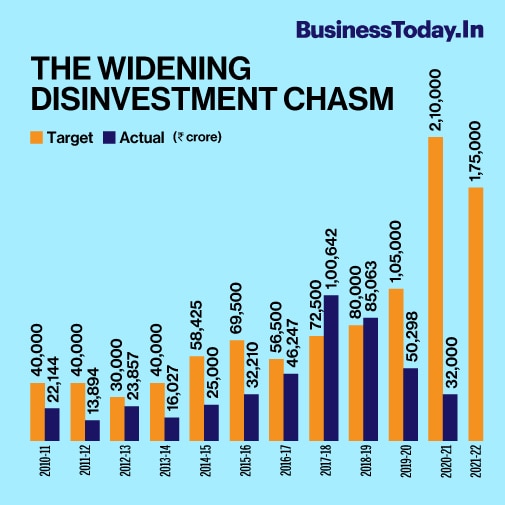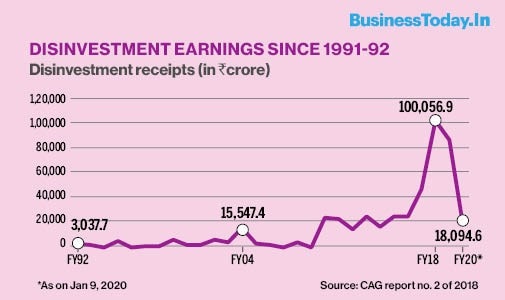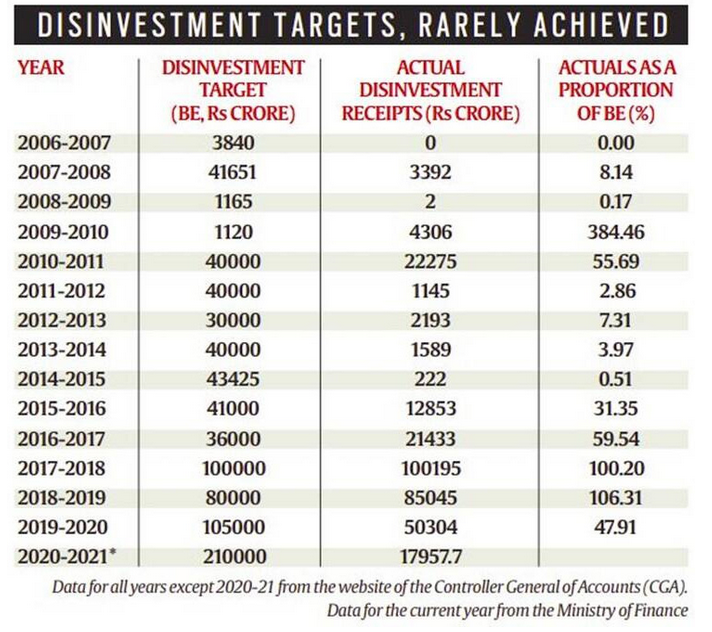What is Disinvestment?
5paisa Research Team
Last Updated: 19 Sep, 2024 03:36 PM IST

Content
- Introduction
- What is Disinvestment?
- How does Disinvestment work?
- Example of Disinvestment
- Causes of Disinvestment
- Why do companies disinvest?
- What does disinvestment mean for our economy?
- Wrapping Up
Introduction
Disinvestment is the opposite of investment. Disinvestment is an intentional effort to reduce, usually by force, something that was previously invested in. For example, disinvestment happens when a country's government tries to undermine or remove foreign businesses from its country.

Source : Business Today
Even though disinvestment is often political in nature, it can also be financial. For example, some countries have disinvested from their own companies by selling off their shares. And on a smaller scale, many investors choose to disinvest from companies that they don't think are doing well.
What is Disinvestment?
Disinvestment is a process of reducing one's investment in a business. In most cases, disinvestment refers to the withdrawal of capital from a business by its owners. The most common situation in which this occurs is when a company is being sold or broken up, and the existing owners reduce their exposure to the company by selling part or all of their shares.

Disinvestment can also occur when a business is a subsidiary of a larger corporation. In these cases, the parent corporation may exercise its right to purchase stock in the subsidiary at the current market price, usually as part of an effort to reduce expenses and increase profitability.
In some cases, shareholders may disinvest simply by selling their shares on the open market. This is most likely to occur when they expect that the stock price will decline as a result of poor performance on the part of the company itself or changes made by management. Furthermore, some shareholders may be forced to sell their holdings if they need cash and cannot obtain it any other way.
How does Disinvestment work?
Disinvestment refers to the selling of stocks or bonds. The selling of stocks usually happens when investors are pessimistic about the future of a company. In contrast, the selling of bonds occurs when they are worried about the financial health of a government, municipality or other entity that issues them.

A company disinvests when it no longer wants to be associated with something or someone. For example, a company disinvests in a project if it is no longer profitable or if it has become controversial. Disinvestment can also refer to cutting funding for programs, people or organizations.
Loss of confidence in an organization is often accompanied by loss of investment. The two are sometimes used interchangeably, but not always.
Example of Disinvestment
Many companies don't want to be associated with tobacco products because they are harmful and difficult to market to consumers. As a result, tobacco companies have started to disinvest in their own brands by selling them off so they can funnel resources into healthier products. This is also true in the case of fossil fuels and carbon emissions. Companies like ExxonMobil have begun selling off assets, so they can invest in renewable energy sources instead. This may be due to consumer preferences, government regulation or both.
Causes of Disinvestment
Disinvestment is the opposite of investment, and it has occurred in many industries. Several factors can cause disinvestment; here are some of the leading causes::
- Business failure- A business fails due to poor management, lack of capital or other reasons. The owners or shareholders may then sell their assets to pay off debts.
- Carrier divestiture- When a company decides to sell its network assets to another operator, it is known as Carrier divestiture. For example, when MCI decided to sell its network to Verizon, it was a major carrier divestiture.
- Carrier exit- When a carrier leaves a market or decides not to serve customers there any longer, disinvestment may occur if another operator does not enter the market immediately.

Market consolidation occurs when one company buys out another company, resulting in fewer competitors in the industry overall. Industry mergers are common during times of deregulation, and they often lead to disinvestment as redundant facilities are closed or sold off by newly formed companies. Cost savings are realized through reduced overhead costs, greater economies of scale and increased control over supply chains.
Forced divestiture is the legal process against which companies must defend themselves when government rules dictate that they must split up their assets
Why do companies disinvest?
A company can disinvest by pulling its assets out of one business or industry and then using them for another purpose. For example, a company might sell off its assets in one area and use that money to create a new product line in another sector. Or a company might sell off its assets and use the proceeds to buy back stock and increase shareholder value.
Disinvestment can also refer to the process of selling assets entirely and getting out of a certain business or industry. This is usually done when companies feel that there is not enough profit potential for them in their current line of work.
A reduction in capital inflows from one company into another results in less money available for investment purposes and a slowdown in business operations as a result.
What does disinvestment mean for our economy?
Although it's not something you hear being discussed every day, disinvestment has a significant impact on the economy. When companies stop investing in their businesses, they can begin to lose money. And when a company loses money, it may have to cut jobs and shrink operations, which can have a ripple effect on other businesses in the community.
Admittedly, disinvestment isn't something that happens overnight. The process can take years, and sometimes its effects don't become clear for a decade or more.
In economics, disinvestment takes place when money moves from one industry or region into another one. When an investor chooses to change the area in which money is invested to another area, this process is known as disinvestment. This can also happen if an investor liquidates assets and uses the money to invest in something else. Disinvestment takes place when investors move their money out of an area and move it into another area.
Wrapping Up
Disinvestment is simply the opposite of investment. It means that a business, government, or individual no longer invests in something — and the effects of that disinvestment can be varied and far-reaching. As seen above, this term is usually used when referring to businesses, stocks or other investments that have not been doing well in the market.
More About Stock / Share Market
- What is Gap Up and Gap Down in Stock Market Trading?
- What is Nifty ETF?
- ESG Rating or Score - Meaning and Overview
- Tick by Tick Trading: A Complete Overview
- What is Dabba Trading?
- Learn about Sovereign Wealth Fund(SWF)
- Convertible Debentures: A Comprehensive Guide
- CCPS-Compulsory Convertible Preference Shares : Overview
- Order Book and Trade Book: Meaning & Difference
- Tracking Stock: Overview
- Variable Cost
- Fixed Cost
- Green Portfolio
- Spot Market
- QIP(Qualified Institutional Placement)
- Social Stock Exchange(SSE)
- Financial Statements: A Guide for Investors
- Good Till Cancelled
- Emerging Markets Economy
- Difference Between Stock and Share
- Stock Appreciation Rights(SAR)
- Fundamental Analysis in Stocks
- Growth Stocks
- Difference Between ROCE and ROE
- Markеt Mood Index
- Introduction to Fiduciary
- Guerrilla Trading
- E mini Futures
- Contrarian Investing
- What is PEG Ratio
- How to Buy Unlisted Shares?
- Stock Trading
- Clientele Effect
- Fractional Shares
- Cash Dividends
- Liquidating Dividend
- Stock Dividend
- Scrip Dividend
- Property Dividend
- What is a Brokerage Account?
- What is Sub broker?
- How To Become A Sub Broker?
- What is Broking Firm
- What is Support and Resistance in the Stock Market?
- What is DMA in Stock Market?
- Angel Investors
- Sideways Market
- Committee on Uniform Securities Identification Procedures (CUSIP)
- Bottom Line vs Top Line Growth
- Price-to-Book (PB) Ratio
- What is Stock Margin?
- What is NIFTY?
- What is GTT Order (Good Till Triggered)?
- Mandate Amount
- Bond Market
- Market Order vs Limit Order
- Common Stock vs Preferred Stock
- Difference Between Stocks and Bonds
- Difference Between Bonus Share and Stock Split
- What is Nasdaq?
- What is EV EBITDA?
- What is Dow Jones?
- Foreign Exchange Market
- Advance Decline Ratio (ADR)
- F&O Ban
- What are Upper Circuit and Lower Circuit in Share Market
- Over the Counter Market (OTC)
- Cyclical Stock
- Forfeited Shares
- Sweat Equity
- Pivot Points: Meaning, Significance, Uses & Calculation
- SEBI-Registered Investment Advisor
- Pledging of Shares
- Value Investing
- Diluted EPS
- Max Pain
- Outstanding Shares
- What are Long and Short Positions?
- Joint-Stock Company
- What are Common Stocks?
- What is Venture Capital?
- Golden Rules of Accounting
- Primary Market and Secondary Market
- What Is ADR in Stock Market?
- What Is Hedging?
- What are Asset Classes?
- Value Stocks
- Cash Conversion Cycle
- What Is Operating Profit?
- Global Depository Receipts (GDR)
- Block Deal
- What Is Bear Market?
- How to Transfer PF Online?
- Floating Interest Rate
- Debt Market
- Risk Management in stock Market
- PMS Minimum Investment
- Discounted Cash Flow
- Liquidity Trap
- Blue Chip Stocks: Meaning & Features
- Types of Dividend
- What is Stock Market Index?
- What is Retirement Planning?
- What is a Stockbroker?
- What is the Equity Market?
- What is CPR in Trading?
- Technical Analysis of Financial Markets
- Discount Broker
- CE and PE in the Stock Market
- After Market Order
- How to earn ₹1000 per day from the stock market
- Preference Shares
- Share Capital
- Earnings Per Share
- Qualified Institutional Buyers (QIBs)
- What Is the Delisting of Share?
- What Is The ABCD Pattern?
- What is a Contract Note?
- What Are the Types of Investment Banking?
- What are Illiquid stocks?
- What are Perpetual Bonds?
- What is a Deemed Prospectus?
- What is a Freak Trade?
- What is Margin Money?
- What is the Cost of Carry?
- What Are T2T Stocks?
- How to Calculate the Intrinsic Value of a Stock?
- How to Invest in the US Stock Market From India?
- What are NIFTY BeES in India?
- What is Cash Reserve Ratio (CRR)?
- What is Ratio Analysis?
- Preference Shares
- Dividend Yield
- What is Stop Loss in the share market?
- What is an Ex-Dividend Date?
- What is Shorting?
- What is an interim dividend?
- What is Earnings Per Share (EPS)?
- Portfolio Management
- What Is Short Straddle?
- The Intrinsic Value of Shares
- What is Market Capitalization?
- What is ESOP? Features, Benefits & How Do ESOPs Work.
- What is Debt to Equity Ratio?
- What is a stock exchange?
- Capital Markets
- What is EBITDA?
- What is Share Market?
- What is an investment?
- What are Bonds?
- What Is a Budget?
- Portfolio
- Learn How To Calculate The Exponential Moving Average (EMA)
- Everything about the Indian VIX
- The Fundamentals of the Volume in Stock Market
- Offer for Sale (OFS)
- Short Covering Explained
- Efficient Market Hypothesis (EMH): Definition, Forms & Importance
- What Is Sunk Cost: Meaning, Definition, and Examples
- What Is Revenue Expenditure? All You Need To Know
- What are operating expenses?
- Return On Equity (ROE)
- What is FII and DII?
- What is Consumer Price Index (CPI)?
- Blue Chip Companies
- Bad Banks And How They Function.
- The Essence Of Financial Instruments
- How to Calculate Dividend per Share?
- Double Top Pattern
- Double Bottom Pattern
- What is the Buyback of Shares?
- Trend Analysis
- Stock Split
- Right Issue of Shares
- How To Calculate the Valuation of a Company
- Difference between NSE and BSE
- Learn How to Invest in Share Market Online
- How to Select Stocks for Investing
- Do’s and Don’ts of Stock Market Investing for Beginners
- What is Secondary Market?
- What is Disinvestment?
- How to Become Rich in Stock Market
- 6 Tips to Increase your CIBIL Score and Become Loan-worthy
- 7 Top Credit Rating Agencies in India
- Stock Market Crashes In India
- 5 Best Trading Books
- What Is the Taper Tantrum?
- Tax Basics: Section 24 Of The Income Tax Act
- 9 Read-worthy Share Market Books for Novice Investors
- What is Book Value Per Share
- Stop Loss Trigger Price
- Wealth Builder Guide: Difference Between Savings And Investment
- What is Book Value Per Share
- Top Stock Market Investors In India
- Best Low Price Shares to Buy Today
- How Can I Invest in ETF in India?
- What is ETFs in Stocks?
- Best Investment Strategies in Stock Market for Beginners
- How To Analyse Stocks
- Stock Market Basics: How Share Market Works In India
- Bull Market Vs Bear Market
- Treasury Shares: The Secrets Behind The Big Buybacks
- Minimum Investment In Share Market
- What is Delisting of Shares
- Ace Day Trading With Candlestick Charts - Simple Strategy, High Returns
- How Share Price Increase or Decrease
- How to Pick Stocks in Stock Market?
- Ace Intraday Trading With Seven Backtested Tips
- Are You A Growth Investor? Check These Tips to Increase Your Profits
- What Can You Learn From The Warren Buffet Style of Trading
- Value or Growth - Which Investment Style Can be the Best For You?
- Find Why Momentum Investing is Trending Nowadays
- Use Investment Quotes to Improve Your Investment Strategy
- What is Dollar Cost Averaging
- Fundamental Analysis vs Technical Analysis
- Sovereign Gold Bonds
- A Comprehensive Guide To Learn How to Invest In Nifty In India
- What is IOC in Share Market
- Know All About Stop Limit Orders And Use Them To Your Benefit
- What is Scalp Trading?
- What is Paper Trading?
- Difference Between Shares and Debentures
- What is LTP in the Share Market?
- What is Face Value of Share?
- What is PE Ratio?
- What is Primary Market?
- Understanding the Difference between Equity and Preference Shares
- Share Market Basics
- How to Select Stocks for Intraday?
- What is Intraday Trading?
- How Share Market Works In India?
- What are Multibagger Stocks?
- What are Equities?
- What is a Bracket Order?
- What Are Large Cap Stocks?
- A Kickstarter Course: How To Invest In Share Market
- What are Penny Stocks?
- What are Shares?
- What Are Midcap Stocks?
- Beginner's Guide: How to Invest in the Share Market Successfully Read More
Disclaimer: Investment in securities market are subject to market risks, read all the related documents carefully before investing. For detailed disclaimer please Click here.

